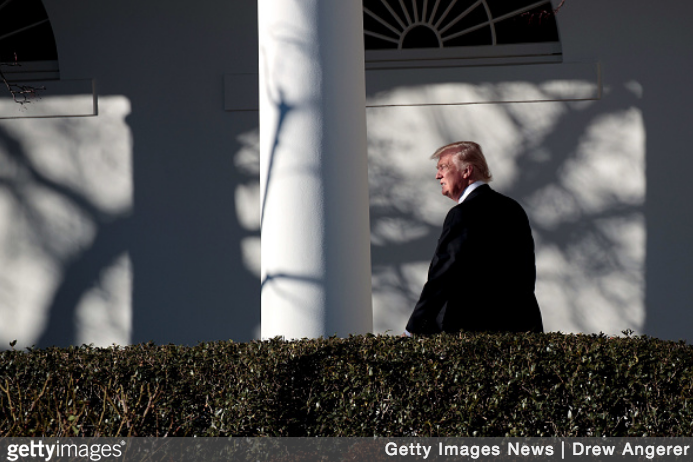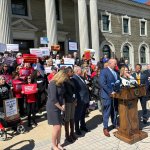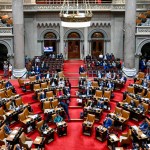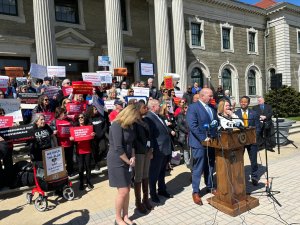Of the nearly four-dozen Muslim Americans involved in terror plots in 2016, only nine had familial ties to the seven countries listed in President Donald Trump’s purported Muslim immigration ban and none successfully carried out attacks, a new study on violent extremism released Thursday revealed.
Researchers with the Triangle Center on Terrorism and Homeland Security at Duke University also discovered that the 46 cases involving Muslim Americans marked a 40-percent drop from 2015, though the number of investigations remained higher than the annual average since the Sept. 11, 2001 attacks.
Among the study’s additional findings: of the nearly 46 cases, 23 were associated with plots directed at targets in the United States, 17 of the individuals were monitored by law enforcement before turning violent and the number of Americans killed by Muslim extremists rose to 123 since 9/11. During that same period, 240,000 people died on American soil.
“This is a dramatic and misdirected overreaction to a relatively small-scale problem,” Charles Kurzman, professor of sociology at the University of North Carolina at Chapel Hill, and author of the study wrote in Huffington Post.
While Trump said Friday that his new immigration measures were necessary to “ensure we aren’t admitting into our country the very threats that our men and women are fighting overseas,” the study found that descendants from the very nations included in his immigration ban have not caused a single death on American soil since 9/11.
More aggressive policies directed at Muslim immigrants was a core piece of then-candidate Trump’s appeal to Americans during last year’s acrimonious presidential campaign. As Trump espoused populist rhetoric, he often keyed in on Muslims by calling for a ban on all non-US Muslims entering the country. Under pressure from members of his own party, Trump backtracked and proposed a scaled down policy that he described as “extreme vetting” of immigrants from predominantly Muslim nations.
Now in office, Trump will be signing an executive order effectively closing off America’s border to citizens of seven Muslim-majority countries and suspending refugee resettlement, except for religious minorities, such as Christians. Muslim advocacy groups condemned Trump’s reported Muslim immigration ban and were troubled by his prioritizing of one religious group over another.
“This is happening because of xenophobia and Islamophobia, this is not happening because of national security reasons,” Abed Ayoub, national legal and policy director for the Washington, D.C. based American-Arab Anti-Discrimination Committee (ADC), told the Press.
Muslim Americans make up less than one percent of the entire US population but are often the targets of controversial law enforcement tactics. In the past, mosques have been under surveillance by undercover officers and informants and Muslim student groups and Muslim-owned business have been scrutinized despite no evidence of wrongdoing.
As the study noted, Muslim American extremists have been responsible for 123 of the nearly a quarter of a million who have been killed in the US since 9/11—accounting for less than one percent of all slayings that occurred. Last year alone, 188 Americans were killed in mass shootings that did not involve Muslim extremists.
Still, the issue of extremism focused heavily on the Muslim community last summer after Omar Mateen, who spent part of his childhood in Westbury, murdered 49 partygoers inside an Orlando nightclub. The horrific slaying was the largest mass shooting by a lone gunman in US history and caused the most deaths of any terror attack since 9/11. Months later, Ahmad Khan Rahami planted an explosive that injured 31 people in the New York City neighborhood of Chelsea; luckily, no one died.
One common thread throughout the study was the influence of the so-called Islamic State. Many of the plots disrupted by law enforcement last year “appear to have been inspired at least in part by the ideology of” ISIS, the study said. Similarly, 65 Americans who law enforcement identified as having traveled overseas attempted or did join the Nursa Front, a former al Qaeda affiliate, or ISIS.
As for those with connections to the seven nations impacted by Trump’s immigration ban, the study found that only nine of the 46 Muslim extremists identified in 2016 had such ties, as did less than a quarter overall since 9/11. Those countries include Syria, Iraq, Iran, Libya, Somalia, Sudan and Yemen.
The study also found that immigrants were not significantly more predisposed to violent extremism than those born in the US. In fact, converts accounted for the highest percentage (35) of Muslim-American extremism cases since 9/11 as opposed to 24-percenet of Muslim-born immigrants or the nearly 18-percent born in the US.
The findings indicated that “it is not accurate to suggest that Muslim-American violent extremists have a distinct demographic profile,” the study said, noting that similar conclusions have been made by law enforcement.


























